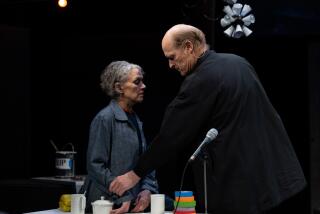DRAMA
- Share via
THE SISTERS ROSENSWEIG by Wendy Wasserstein (Harcourt Brace: $17.95; 109 pp.). One reason Wendy Wasserstein’s characters are so compelling is that they have been invented by such a half-breed: a feminist playwright who can’t seem to ignore the enticing call of the comfy Jewish suburban family. You can hear this call in the play that won her the Pulitzer Prize, “The Heidi Chronicles,” which ended happily when the heroine adopts a baby to raise on her own. And you can feel it intimately in the relationship at the center of this play. Sara, a 54-year-old British financier with “the biggest balls at the Hong Kong/Shanghai bank,” “no longer sees the necessity for romance” until she meets Merv, a 58-year-old furrier (“Shhh! Please, synthetic animal covering,” he tells progressive clients). Vintage Wasserstein, their courtship is one of passion thinly concealed by pugnaciousness. Sara: “How many support groups did you join when Roslyn died? I’m sorry that was cruel.” Merv: “No, but it was in surprisingly bad taste. I joined two.” Sara: “And what did you learn about yourself?” Merv: “That I couldn’t write poetry.”
Just as marriage seems inevitable, though, Wasserstein steers the romance askew by having Sara limit their relationship to a friendship. Cynics will say that Wasserstein--remembering how prominent feminists upbraided her for suggesting in “The Heidi Chronicles” that a woman needs a baby to be happy--is simply going against the natural emotional drift of her play in order to be PC. But the plot diversion is actually central to Wasserstein’s message, which is that nesting must be counterbalanced by questing. Not coincidentally, this is similar to the message of Chekov’s “The Three Sisters.” But the success of Wasserstein’s characters at heeding it is all the more remarkable because their bi-coastal, bisexual lives are infinitely more disorienting than those in Tsarist Russia.
More to Read
The biggest entertainment stories
Get our big stories about Hollywood, film, television, music, arts, culture and more right in your inbox as soon as they publish.
You may occasionally receive promotional content from the Los Angeles Times.









